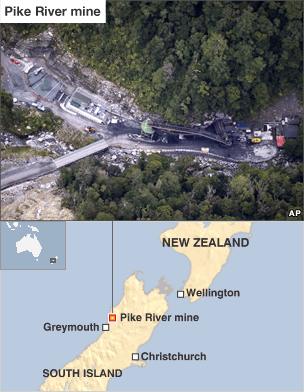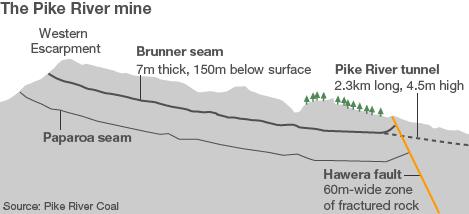Families of trapped New Zealand miners face more delays
- Published
Superintendent Gary Knowles said the focus was still on bringing the miners out alive
The agony of families of 29 men trapped underground after an explosion at a New Zealand mine is set to continue as delays plague the rescue effort.
Toxic gas levels have kept rescuers out, and a test shaft is being drilled through 150m (500 feet) of rock.
The only relief for helpless families on Sunday was being taken to view the mine, reports the BBC's Greg Ward.
No contact has been made with the miners since Friday's blast at the mine near Greymouth on the South Island.
Rescuers say they have "no idea" how long it might take to reach the men, but they insist they remain positive about finding them alive.
The missing workers, aged from 17 to 62, include 24 New Zealanders, two Australians, two Britons and a South African.
Emotional
Tearful families members were taken on a tour of the site of the Pike River coal mine on Sunday, in an effort to help them understand the dangers keeping rescuers at bay and to show them the rescue drills that are under way in preparation for an eventual operation.

Families were taken to the site on Sunday to see rescue preparations
"There was a lot of emotion on the site... there were some very poignant things up there for them, cars still parked and other things, and they were very emotional," said Pike River chief executive Peter Whittall, according to AFP news agency.
He said that - 48 hours after the men were trapped - the families were "starting to be very concerned and want as much information as they can".
Laurie Drew, whose 21-year-old son Zen is among those trapped, told New Zealand's TV3 network that seeing a board with the men's name tags missing was "hard".
There were packed Sunday services at churches close to the mine as locals prayed together for the men to be found alive.
Tests at the mine show there are still a dangerous level of poisonous or potentially explosive gases in the mine, including carbon monoxide and methane, which rescue officials say make it unsafe for crews underground.
Now a new 6in-wide (15cm) shaft is being drilled from the mountain above into the centre of the mine to test gas levels there, and possibly put a camera down.

It will have to pass through 500 feet (150m) of rock in an operation likely to take 16-24 hours, adding to the families' agonising wait.
But Superintendent Gary Knowles, the head of the rescue effort at the Pike River coal mine said he remained positive about finding them alive.
Supt Knowles said there was no "quick fix", but that rescue workers were doing all they could to find those missing.
Mr Knowles denied suggestions rescue teams were showing a lack of urgency because they believed the chances of finding the miners alive were low.
"I find that really repugnant," he told a news conference on Sunday.
"We're talking about people's lives here... My decision is made based on safety and what experts are saying."
The authorities are facing increasing pressure to clear the way for rescue teams to enter the mine, our correspondent says.
But they have repeatedly stressed the need to wait until it is safe - their great fear is that searching the mine could spark a second explosion, he says.
Each miner carried 30 minutes of oxygen, enough to reach oxygen stores in the mine that would allow them to survive for several days.
Fresh air is also being pumped into the mine through a shaft.
The men would have been carrying flasks of water, reports say, but there is no food underground.
Unconscious
The explosion at the mine, near the coastal town of Greymouth, is thought to have happened at around 1530 (0230 GMT) on Friday.
Two workers who walked out of the mine have been treated in hospital for moderate injuries but have since been discharged.
One of them, coal cutter Russell Smith, told New Zealand's TV3 network he had been late for work and so was not as far into the mine when the explosion hit.
Nevertheless, he said he had been knocked unconscious by the strength of the blast.
He said he saw a flash and then felt a series of shockwaves come down the mine.
"My hat was ... torn off me," he told TV3. "I remember struggling for breath."
He said he had been very lucky.
"I could have been blown to bits," he said.
He was found about 15m away from his vehicle and together with Daniel Rockhouse eventually found his way out of the mine.

- Published21 November 2010
- Published14 October 2010
- Published19 November 2010
- Published19 November 2010
- Published20 November 2010